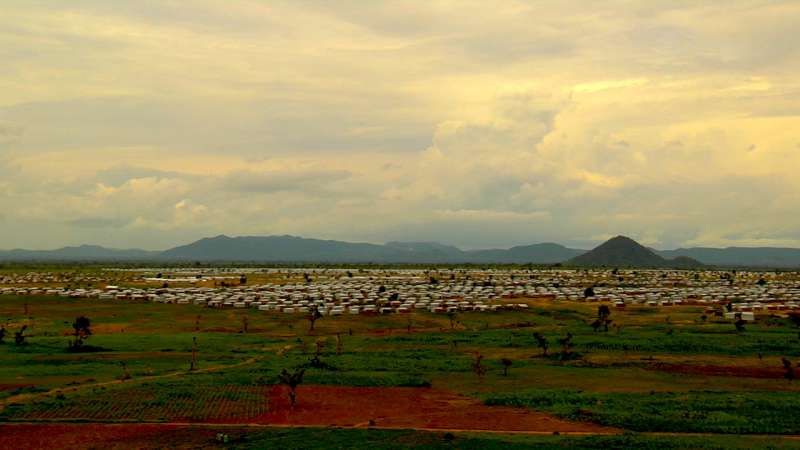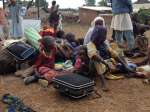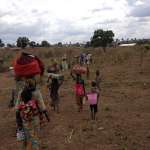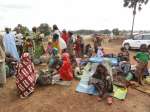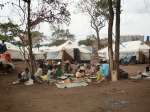- Text size
 |
|  |
|  |
| 
- عربي
"Even the Hills Couldn't Save Us" - Escape From Nigeria
News Stories, 14 August 2015
MINAWAO REFUGEE CAMP, Cameroon, Aug 14 (UNHCR) – The UN refugee agency is working with the authorities in countries neighbouring Nigeria to maintain a shrinking humanitarian space as Nigerian insurgents have extended attacks in recent months to Chad, Niger and Cameroon.
Much of the activity has been focused on the UNHCR-managed camp of Minawao, the largest formal refugee camp in the region for Nigerian asylum-seekers.
Minawao camp in northern Cameroon was built for 30,000 people but is now home to nearly 45,000 and growing by the day. UNHCR Representative in Cameroon Khassim Diagne said overcrowding there is "unsustainable".
"The insurgents call themselves Boko Haram", said Nigerian refugee Kulkwa Tatu, who was a teacher in Nigeria's north-eastern Borno State, bordering Cameroon, but has now sought refuge in Minawao. "Boko means 'western education' in the Hausa language", he explained; adding: "and Haram means 'forbidden' in Arabic".
"When Boko Haram burned down my house, possibly because I was a teacher, I cried. Some of my family and I ran up to the hills to escape. But even the hills could not save us. So we ran and ran and then came down here to Cameroon. We thank the Cameroonian government so much for letting us stay."
In recent weeks the Nigerian insurgents have also attacked Cameroon, using suicide bombers – a tactic never before seen in the country.
On July 12 there was an attack on the far-northern Cameroonian town of Fotokol on the border with Nigeria.
Two more major attacks followed in the northern Cameroonian city of Maroua and there have been others in northern Cameroon since.
These attacks have raised fears and tension in Cameroon. They have led the Cameroonian authorities considerably to increase security patrols and other measures, which have inevitably limited freedom of movement for Cameroonians and Nigerian asylum-seekers alike.
Zara Ousman, a woman of 38 who has lived in both Cameroon and Nigeria, fled for her life. "I walked for a day, then I took a motorbike taxi, then I took a car", she said, as she sat on the floor just outside Minawao camp;
Many thousands of Nigerians live in the border areas inside Cameroon. Some are potential asylum seekers but others are economic migrants – or, simply, people living alongside their Cameroonian cousins in an area of porous colonial boundaries.
For about a week earlier this month, increased Cameroonian security patrols and evacuations meant no potential asylum seekers could reach Minawao camp to seek protection. However, UNHCR has been working with Cameroon to try to mitigate this problem.
"For a number of security officials directly involved in the border operations all Nigerians in the border areas are potentially complicit with the insurgents, including asylum-seekers", said UNHCR northern Cameroon head Mamady Fatta Kourouma;
"So the authorities said that for security reasons there should be no more movement towards the camp," he added.
"But we have negotiated some access to the camp to provide protection. I met the Governor of the Region, I met the Colonel in charge of operations. And between us we found common ground", he explained. "Now a reception centre for refugees is open [just outside the main camp] and some refugees are allowed to go there".
Some new arrivals have therefore arrived in the reception centre over the past few days. On Wednesday (Aug 12), there were about 50 in the reception centre, just outside the camp-proper, according to Charles Gatoto, a senior UNHCR official.
It is a very simple, basic place with plastic-sheeting structures to keep off some of the heavy sun and rain. But there is a water supply and basic toilets.
The 50 people will be screened by a joint Cameroonian government/UNHCR team for possible entry into Minawao camp, Gatoto added.
Hadidja Saleh, a woman of 20, is among them. She came on a motorcycle-taxi with three children, including her two-year-old twin boys, Abba and Malla.
Camp managers at Minawao say that because of the overcrowding there are constant shortages of basic materials like wood to build shelters, and even nails.
The wood shortage is serious because Minawao is in a relatively arid area of Cameroon. During the current precious rainy season, the plateau surrounding the camp is dotted with millet and cotton fields scoured from the stony ground by hand.
The surrounding mountains are speckled green with grass. But in the dry season Minawao is extremely hot – up to 45 C. In this season the greenery all but disappears. Water for drinking and washing is hard to access.
The UNHCR is negotiating with the Cameroonian government for a second camp to relieve the congestion, and water shortages, in Minawao.
By Mark Doyle, Cameroon
